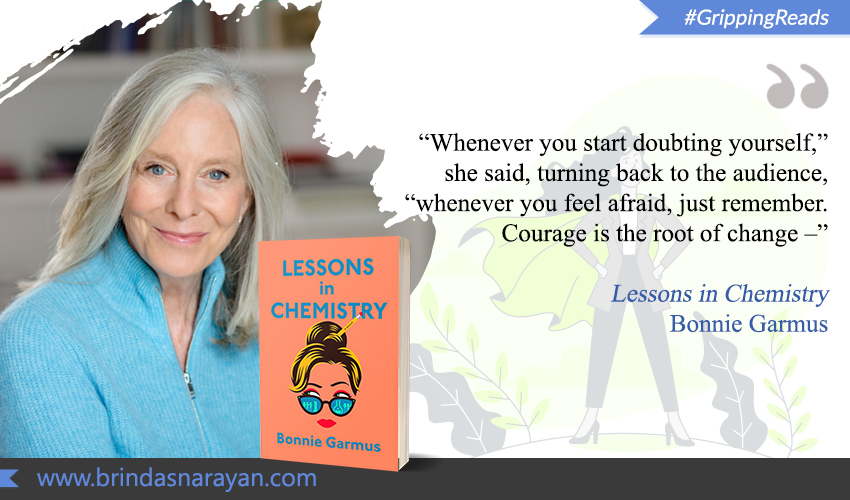
Empowering Women With A TV Cooking Show
For all who have taken to playing chess since The Queen’s Gambit. Or have reassessed their flippant dismissal of the aspirations that abide in Kamathipura since Gangubai Kathiawadi. Or to those who wonder about the historical forces that have led to far fewer female comedians since The Marvelous Mrs. Maisel. Read Lessons in Chemistry, a stylish and feisty debut by the now 66-year-old Bonnie Garmus, a copywriter and creative director, a swimmer, rower and mother of “two pretty amazing daughters.”
The book might prod folks who have been wrongfully dismissed or aggravatingly undermined to sharpen their knives, or pencils, or surgical scalpels and re-take domains in which they have always – despite their own self-doubts or imposter syndromes – rightfully belonged.
The whip-smart protagonist, Elizabeth Zott, isn’t just diminished. Like many women in the 50s and 60s, she is also harassed, assaulted, deceived, fired. Fortunately, she’s obstinate and unrelenting, and unafraid to express her views. Despite being underemployed as a TV cooking show host, she urges her audiences – all women – to treat cooking with respect.
Zott is right. Cooking is chemistry. Moreover, as she explains the various processes that unfold with each step, it gets elevated to molecular gastronomy. She refuses to talk down to home cooks, who are never just home cooks. They are chefs, artists and alchemists who are not accorded the right treatment or designations since they belong to the “wrong” gender. When Elizabeth suggests they “combine one tablespoon acetic acid with a pinch of sodium chloride,” we applaud and decry the manner in which her audiences thirst for a voice like hers.
Along with recipes for wholesome, hearty meals – “stews, casseroles, things made in big metal pans” (I’m thinking the Indian equivalents would be kichdis and biryanis), Zott also doles out life advice. She urges women to think about careers that have been shortened or abandoned. Of degrees not pursued. Of ambitions cut short by husbands or kids. Even of the kinds of bonds that might keep a couple together or tear them apart.
As Elizabeth proclaims to her TV viewers: If you’re lucky enough to share a “covalent bond”, “you both have strengths that, when combined, create something even better.” Then again, relationships can be superficial and breakable. Based perhaps on the way he or she looks. All it takes are a few conversations for everything to crumble. “Like the hydrogen bond – the most fragile, delicate bond of all.”
Zott herself is fortunate to bump into the love of her life. Calvin Evans is a fellow-chemist, and someone who respects her not just for her body, but also her mind. He’s also a rower and a holder-of-grudges. In their first encounter, she barges into his office at the Hastings Research Institute to borrow beakers. He assumes she’s a secretary. A later meeting is worse: Evans is sick and vomits on her. Nonetheless, they soon discuss “polyphosphoric acids” and “sex discrimination” over cafeteria coffees. And pretend to dislike each other, till they are head over heels to an extent that “[they] made other couples sick.”
It helps that they both stem from troubled childhoods, and mysterious pasts, with absent or intolerant fathers, missing or unknown mothers; they understandably cling to each other as the only semblance of family. Till their mangy dog, Six-Thirty, joins them to form a trio.
Unfortunately, Evans dies in a tragically comic accident. Six-Thirty, the creature with a prodigious and growing vocabulary, tugs his master to an unintended death. Elizabeth is already pregnant, though she doesn’t know it then. When she discovers her out-of-wedlock child, she is fired from her Research Institute. Unfazed, she sets up her laboratory at home, intent on pursuing the study of “abiogenesis” – which involves examining the origins of life from inorganic substances. Even as she births her endearingly inquisitive daughter Madeline (Mad).
Later, she tucks notes into her daughter Mad’s lunches. Not benign or even maudlin ones like, “I love you.” Zott is clearly determined to raise a tough-ass daughter who will take on the surrounding patriarchy. Notes like, “It is not your imagination. Most people are awful.” Mad, like her mother, is brilliant and precocious. She can read from the age of three and is done with most of Dickens by the age of five. She’s also mature enough to mask her gifts from insecure teachers and peers. Unlike her mother, who’s a belligerent and devil-may-care misfit, Mad yearns to belong.
The TV show, Supper at Six, follows Mad’s birth. After all, Zott has to make ends meet. Even there, she has to face familiar and by now, tiresome battles. The head of the station (Phil) wants her to do it his way: with “[tight] dresses, suggestive movements.” To end the show by mixing a cocktail. Elizabeth does not comply. Not even mildly. She does it on her own terms. She wears pants, she uses academic and complex terms, she refuses to crack jokes or appear light-hearted. Fortunately, for us, she sends the cocky and learing Phil packing.
While some loose ends might be tied up too neatly at the end, Lessons in Chemistry is one of those unforgettable reads. It’s witty, funny, sharp – and it features a strong woman who’s unafraid to be herself. All this, in an era, that was hardly supportive of female achievers in any realm, but more so in Science and Technology. It’s the kind of book that will alert future generations to the hurdles crossed by earlier ones – to hard-won freedoms that some might take for granted today. For many others whose situation hasn’t shifted at all, this is an empowering pick-me-up. To top it all, it’s immensely entertaining and narrated with verve.
References
Bonnie Garmus, Lessons in Chemistry, Doubleday (Penguin Random House UK), 2022




